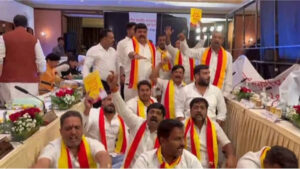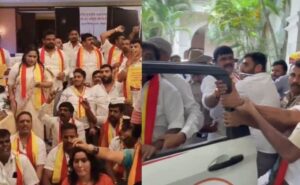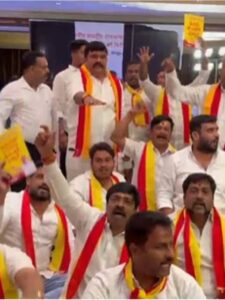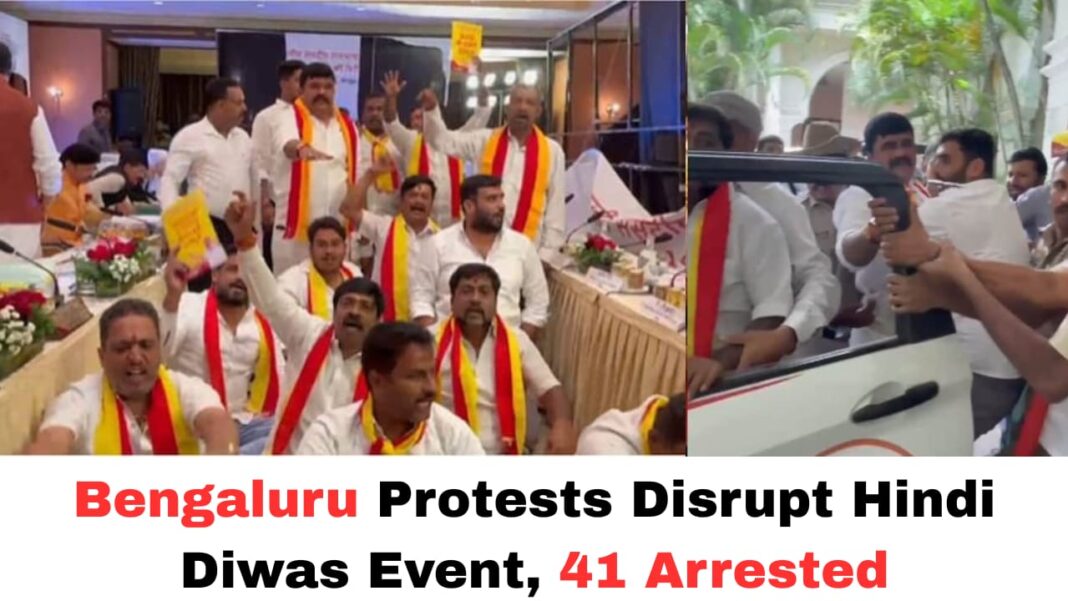Digital News Guru Karnataka Desk:
“Hindi Imposition”: Pro-Kannada Activists Disrupt Bengaluru Hindi Diwas Event, 41 Arrested
Bengaluru, In a dramatic escalation of linguistic tensions, around 41 members of the pro-Kannada organisation Karnataka Rakshana Vedike (KRV) were arrested on Thursday for storming a Hindi Diwas promotion event organised by the Ministry of Home Affairs in Bengaluru. The activists alleged the programme was an attempt to “impose Hindi” on non-Hindi speaking states, particularly Karnataka.
The Incident
The three-day meeting, organised by the Parliamentary Committee on Official Language, was held at the Taj West End hotel on Race Course Road, Bengaluru, from September 23 to 25. The final day’s session began at 9:30 am and proceeded peacefully until approximately 10:45–11:00 am.

At that point, a group of between 30 and 40 activists, clad in yellow and red scarves, barged into the hall, raising slogans, tearing posters, damaging furniture, and confronting attendees and organisers.
The protesters physically obstructed officials and participants. Visuals from the venue show chaos inside the luxury hotel: banners ripped, chairs disturbed, and the meeting’s momentum temporarily stalled. In response, police intervened swiftly, detaining the activists, restoring order, and enabling the meeting to resume and eventually conclude.
The Bengaluru Police registered a case at High Grounds Police Station. The 41 detainees were produced before the 1st Additional Chief Judicial Magistrate (ACJM) Court, which remanded them to judicial custody.
Motivations and Claims
The KRV activists claimed the meeting’s agenda—and the event itself—served as a vehicle to extend Hindi’s reach across central government offices, undermining the status of Kannada. They argued the event was part of a larger push by the central government to prioritize Hindi proficiency, possibly rewarding Hindi speakers with higher pay or opportunities.
Arun Javagal, state secretary of KRV, asserted that instead of engaging in dialogue, authorities resorted to “arresting activists and filing baseless cases.” He maintained that the protest was necessary to protect Karnataka’s linguistic identity. Other KRV leaders accused the administration of showing disregard for Kannadiga sentiments.

In response, police and event organisers maintained that the disruption was unlawful, justifying immediate action to restore order.
Historical & Social Context
This clash is far from isolated. Karnataka has long been a flashpoint in debates over language policy and the perceived “imposition” of Hindi in non-Hindi states. Anti-Hindi agitations have recurred over decades, particularly in Karnataka.
In earlier years, protests have erupted in response to Hindi signage in metro stations, central government programmes favouring Hindi, and institutional promotion of Hindi in administration. The KRV itself was founded expressly to defend Kannada language, culture, and regional identity.
The historically fraught relationship between central and state language policies makes such clashes particularly sensitive. For many in Karnataka, language is not merely a means of communication but a core marker of identity and pride.
Conclusion
The Bengaluru protest and subsequent arrests over the Hindi Diwas event represent more than a one-off confrontation. They reflect deep anxieties about language, regional identity, and the balance between national unity and local diversity. As India continues to navigate its multilingual reality, the tension between promoting a national lingua franca and respecting the linguistic mosaic of its states remains a fraught and sensitive fault line.

The protesting group was Karnataka Rakshana Vedike (KRV), a pro-Kannada organization. They claimed the event was part of an ongoing attempt to impose Hindi in non-Hindi speaking states (in this case, Karnataka). They objected especially to aspects like offering incentives or promotions based on Hindi proficiency, viewing them as undermining Kannada and linguistic rights in Karnataka. Such protests are part of a long-standing sensitivity in Karnataka and other non-Hindi speaking states against central language policy initiatives seen as marginalizing regional/local languages.
Karnataka, with its history of resistance to what many residents see as linguistic overreach, remains a potent crucible in which the boundaries of India’s language policy will be tested.
You May Also Read: MiG-21 Retirement: India’s Legendary Fighter Jet Bows Out After 62 Years








